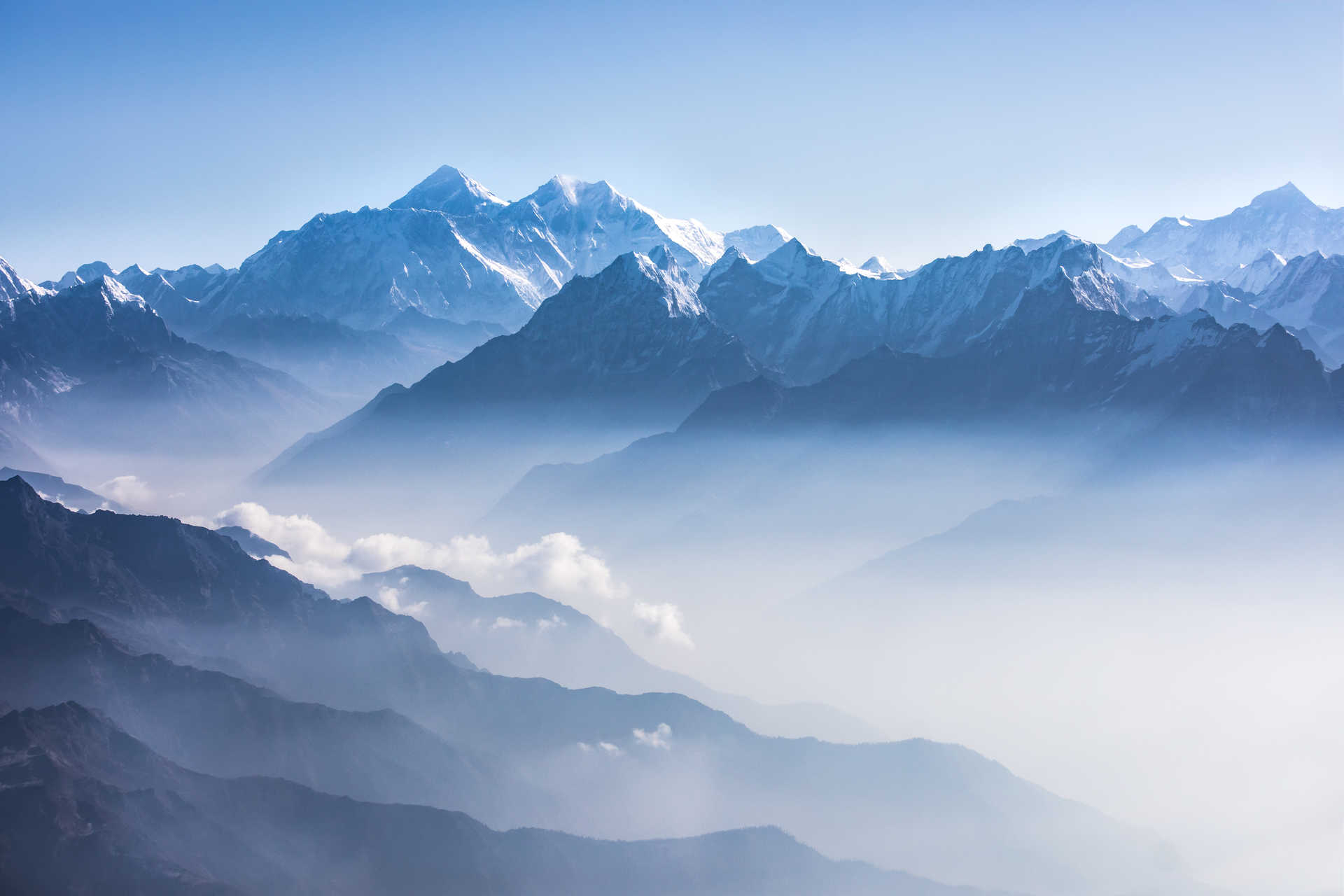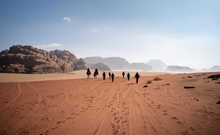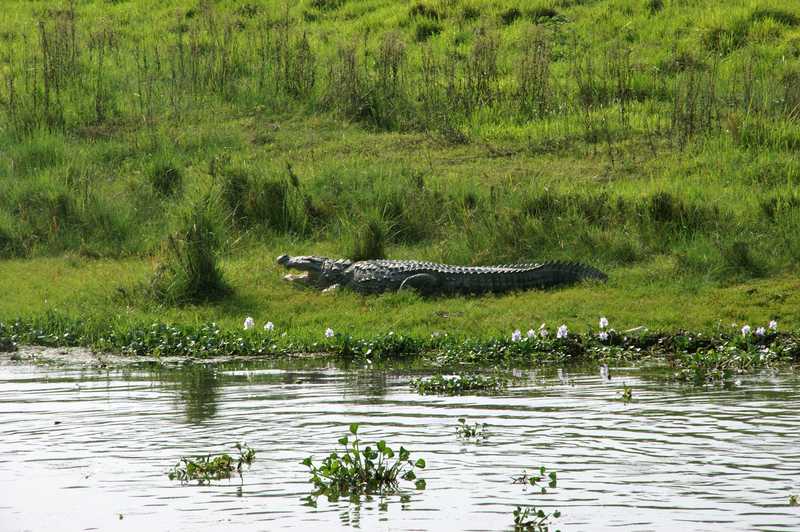The Three Passes Trek
- Kandoo Trekking

Contact
our UK team

All trekkers need to organise their own flights to Kathmandu International Airport (KTM). From the airport we will arrange a private transfer to your hotel. That night you will meet your local Kandoo representative and have a full pre-trek briefing
The flight from Kathmandu to Lukla takes 45 minutes and is an adventure in itself with great views of the Everest region and ending with a hair-raising landing on a steep mountain runway. After meeting our crew, we will start our trek by heading up the Dudh Koshi Valley on a well- marked trail to Phakding.
From Phakding, we cross and re-cross the river on high suspension bridges. Beyond Monjo is the entrance to the Sagarmatha National Park. We then ascend steeply to Namche and along the way, if the weather permits, catch the first glimpse of Mt Everest. Namche Bazaar is the main trading village in Khumbu and has a busy Saturday market. You can enjoy an Illy coffee and amazing brownies here!
Namche is tucked away between two ridges and has lots of lodges, tea shops and souvenir shops. Today we will trek up to the Everest View Hotel at 3880m for our first view of Ama Dablam and Mount Everest. Following the ‘walk high, sleep low’ principle, this hike will really help with your acclimatisation.
The trail now splits from the popular base camp route and heads north-west to the village of Thame where you will be staying the night. Take some time here to learn a bit about the local traditions and their intrinsic connection with the mountain on which you are standing.
Today we will start to climb back up to higher altitude heading up the valley to Lungden. Make sure you have your camera at the ready as the higher you go the views across the snow-capped peaks in the region just get better and better.
Today wewill encounter the first of the Three Passes – Renjo La. The route starts off gently but will soon turn into a hard day of hiking as we near the end of the ascent to Renjo La. Try to think of the magnificent views you will get at the top to motivate you! After the pass, we will descend to the third of the beautiful turquoise Gokyo Lakes and then trek onto the village of Gokyo for the night.
Today you climb your first peak, Gokyo Ri, for fabulous views of Cho Oyu. We start the climb early and then have the rest of the day to rest to help our acclimatisation. If we still have energy, then later in the day we can hike up some of the surrounding moraine ridges and enjoy the views. As a treat for all our hard work we can then tuck into some delicious cake from the wonderful Gokyo bakery.
We leave Gokyo to cross the Ngozumpa Glacier. We descend to the second lake and drop down onto the glacier. The route across the glacier is marked by cairns and is generally quite well defined. We climb off the glacier and follow a shallow valley to Tragnag.
An early start is required today to cross the Cho La Pass and make the long descent to Dzongla. Continuing up the valley, we cross a ridge and an old lateral moraine, before beginning the rocky scramble to the pass. From the top there are excellent views, across to the Rolwaling Valley in the west and Ama Dablam to the south east. The descent from here involves crossing a small glacier which is fairly straightforward. There are more excellent views of Ama Dablam and Cholatse as we descend.
The way to Lobuche contours the grassy slopes above a lake, the Tshola Tsho, to join up with the main Everest trail from Pheriche and Tengboche. The trail flattens out and follows the valley on the west side of the Khumbu Glacier to Lobuche.
To reach Everest Base Camp, we follow the Khumbu Glacier. The trail offers superb views of the surrounding mountains, especially where the path is forced to rise to cross a tributary glacier. We stop at Gorak Shep before making our way to Base Camp itself. This takes several hours as the trail weaves its way through ice pinnacles and crevasses of the Khumbu Glacier.
An early morning start is needed to summit the trekking peak of Kala Pattar – the iconic viewpoint of Everest. After snapping some pics, we head back to Gorak Shep for a quick meal before descending further to Lobuche for the night.
We leave the classic base camp route today as we head east through the Khumbu Glacier to reach the third and final pass of the trip – Kongma La. At 5,535m the pass is the highest of the three. After a tiring ascent to the top, we descend into the Chukhung Valley and eventually to the village of Chukhung where we will stay in the lodge overnight.
Today we will climb Chukhung Ri - the hardest of the three peaks on this trek which involves some easy scrambling near the summit. The views from the top down the Khumbu Valley are superb. We descend to Dingboche.
We now descend back to the main Everest trail through Pangboche before climbing to the monastery at Tengboche. From Tengboche we make a steep descent before climbing back up to Kyangjuma where we will stay overnight in a lodge.
We continue through Namche Bazaar, descend Namche Hill and cross the Dudh Koshi. We will trek back along familiar paths to Phakding where we will stay the night.
Our final day's trekking follows the Dudh Koshi back down to Lukla. To celebrate our final night, we have dinner altogether this evening as a full team, it is customary for guests to buy dinner for the porters and guides on this night as a thank you for the support they have given you throughout the trek. There will also be an opportunity for you to hand out your tips for the support team during this meal.
After an early breakfast, we will begin our return journey to Kathmandu.
A free day in Kathmandu to explore the city at your leisure
We will collect you from your hotel and transfer you to Kathmandu Airport for your departing flight.
Treks in the Himalaya present a substantial physical challenge, and the more fit you are before you start, the more you will enjoy your trek. However, the number one most important thing to cultivate is mental toughness. Most of the people who trek in the Himalaya aren’t professional athletes or mountain climbers; they are average people with an unusual degree of determination.
If you are comfortable walking for 7-8 hours with an ascent of 1000m every day for two weeks then you are certainly fit enough to succeed on this trek. We find that all successful hikers share a real Kandoo attitude and that means high levels of grit and determination.
The teahouses in the Khumbu region these days all offer a wide
range of options from local Dhal Bhat (rice and lentil soup) to pasta, pizza
and even chicken burgers and yak steaks. The menu will always feature something
that takes your fancy regardless of your dietary requirements or preferences. We
recommend a budget of £30 to £35 ($40 to $45) per day for meals and drinks. For examples of menus visit our Nepal Trekking Guide.
One word of advice, place your meal order as soon as you can upon arriving at the lodge as it is strictly ‘first ordered, first served’, and the best lodges are quite busy at meal times.
Trekking in Nepal is more popular than ever. As a result, the standard of accommodation available on most of the trek routes has improved dramatically. Where there were once simple peasant huts, large hostels have been built featuring running water, indoor toilets (some en-suite) and electricity. However, while internet access, charging facilities and hot water are available, you will need to pay to use them - if you plan on using the internet and showering every day, then you should budget around $10 per day.
However, development is still ongoing, and as you get higher into the mountains the lodges become more basic. Furnishing is generally fairly spartan, and most rooms feature little more than a bench bed and a thin mattress, so your sleeping kit will probably see some early use. Showers are not always available and it tends to be just the communal areas that are heated.
The exception to that rule is Namche. Namche features some really great lodges, including the Hil-Ten (this is not a region that makes much of copyright infringement) and if you are in need of refreshment there both Illy and Lavazza coffee are available
Kandoo has a list of lodges that we prefer to work with, all of which are regularly inspected to ensure the best quality rooms available. Even at the worst, they are clean and well-kept. When the route is busy, we send a porter ahead to hire rooms for the night, as they cannot be reserved in advance.
The general standard of driving
throughout Nepal is poor and badly regulated. Roads in Kathmandu are very
congested, many drivers are not properly licensed and vehicles are poorly
maintained. During the monsoon season (June to September) many roads outside
the Kathmandu valley are prone to landslides and may become impassable.
We insist on using a high standard of
vehicle and driver for all of our transfers. In Nepal it is not a legal
requirement to have seatbelts fitted in the back of vehicles, and while we try
to use vehicles that do have rear seatbelts fitted, this cannot always be
guaranteed. If you are unhappy about any aspect of the vehicle or the standard
of driving, please speak to the driver or our local office.
Duffel bags
You will be provided with a large duffel bag at the pre-trek briefing that will be yours to use for the duration of your trek. Your equipment will then need to be transferred into this bag. If you are travelling with a duffel bag then it is up to you which bag you choose to use for the trek, if you are travelling with a suitcase then this will need to be left at the pre-trek hotel and collected upon your return as our porters need the bags they carry to be flexible.
All items must be packed in your main
equipment bag. They should not be attached to the outside, as we are not
responsible if items fall off when the bags are being carried on the trek.
We recommend that you take local currency on the actual trek
with you, as the teahouses prefer local currency. You will also get a more
favourable exchange rate in Kathmandu than in the mountains. If you are relying
on a credit or debit card for emergency funds, make sure you tell your card
issuer that you will be using it abroad, or you may find that it won't work
when you really need it.
In Kathmandu a meal for two at a mid range restaurant will
cost ~$20. A taxi will generally start on a base rate of $0.45 and then charge
$0.4 for every km. Or you can ride the bus which will be around $0.15 for a 5km
journey. Souvenirs in Kathmandu are generally on the cheaper side too. Whilst on the trek, we recommend that you budget £30 - £35
($40 to $45) per day for meals and drinks.
We realise that tipping may not be a common practice in all
countries but for Nepal it is a standard practice that all operators
support. The decision on how much to tip should be determined by how well the
team served you while you were on the trek. Tips are always discretionary and
if you are not happy with the service you have received you do not have to pay
tips. Tips can be made in US dollars or Nepali Rupees. It is very important
that US bills be new (less than 10 years old), crisp and untorn.
We are members of the Trekking Agencies Association of Nepal
and the Nepal Mountaineering Association, and follow their guidelines when
recommending tip levels for guides and porters. We would suggest you budget
$300 per trekker for your tip contribution on this route. The group tip can be
given to your porters and guides during your celebratory meal in Lukla on the
final night of your trek. You will then say goodbye to your porters the
following morning.
Duffel bags
You will be provided with a large duffel bag at the pre-trek briefing that will be yours to use for the duration of your trek. Your equipment will then need to be transferred into this bag. If you are travelling with a duffel bag then it is up to you which bag you choose to use for the trek, if you are travelling with a suitcase then this will need to be left at the pre-trek hotel and collected upon your return as our porters need the bags they carry to be flexible.
We
do not have other gear available for rental but there are many places
offering gear for rental in Kathmandu and we can recommend a number of places
for you. The quality of rental gear is very variable and it is your
responsibility to check carefully the condition of any item you rent. We
accept no responsibility for the quality of equipment hired. An indication of
the likely rental costs is below.
Most
of the rental shops close around 8pm, so if you are arriving on a late flight
the day before the trek starts there will not be an opportunity for you to
visit a rental store. If you are planning on renting equipment, you need to
make sure you have allowed sufficient time at the beginning of your trip.
All
rental equipment is included in your overall trekking bag weight, so make
sure you have allowed for this when packing your bag at home. A sleeping bag
will weigh around 2kg.
UPPER
BODY
LEGS
FEET
OTHER ACCESSORIES
| From | To | Price | Availability | Book | Enquire |
|---|---|---|---|---|---|
| 27/04/2025 | 17/05/2025 | £1,979 $2,499 |
Sold out
|
Sold out | Enquire now |
| 14/09/2025 | 04/10/2025 | £1,929 $2,449 |
Available
|
Book now | Enquire now |
| 12/10/2025 | 01/11/2025 | £1,979 $2,499 |
Available
|
Book now | Enquire now |
| 02/11/2025 | 22/11/2025 | £1,979 $2,499 |
Available
|
Book now | Enquire now |
| 22/03/2026 | 11/04/2026 | £1,979 $2,499 |
Available
|
Book now | Enquire now |
| 05/04/2026 | 25/04/2026 | £1,979 $2,499 |
Available
|
Book now | Enquire now |
| 26/04/2026 | 16/05/2026 | £1,979 $2,499 |
Available
|
Book now | Enquire now |
| 13/09/2026 | 03/10/2026 | £1,929 $2,449 |
Available
|
Book now | Enquire now |
| 11/10/2026 | 31/10/2026 | £1,979 $2,499 |
Available
|
Book now | Enquire now |
| 01/11/2026 | 21/11/2026 | £1,979 $2,499 |
Available
|
Book now | Enquire now |
| 22/03/2027 | 11/04/2027 | £2,029 $2,599 |
Available
|
Book now | Enquire now |
| 05/04/2027 | 25/04/2027 | £2,029 $2,599 |
Available
|
Book now | Enquire now |
| 26/04/2027 | 16/05/2027 | £2,029 $2,599 |
Available
|
Book now | Enquire now |
| 13/09/2027 | 03/10/2027 | £1,979 $2,499 |
Available
|
Book now | Enquire now |
| 11/10/2027 | 31/10/2027 | £2,029 $2,599 |
Available
|
Book now | Enquire now |
| 01/11/2027 | 21/11/2027 | £2,029 $2,599 |
Available
|
Book now | Enquire now |
Want to ask us a question or book a private trip? Don't hesitate to contact us!
Contact us